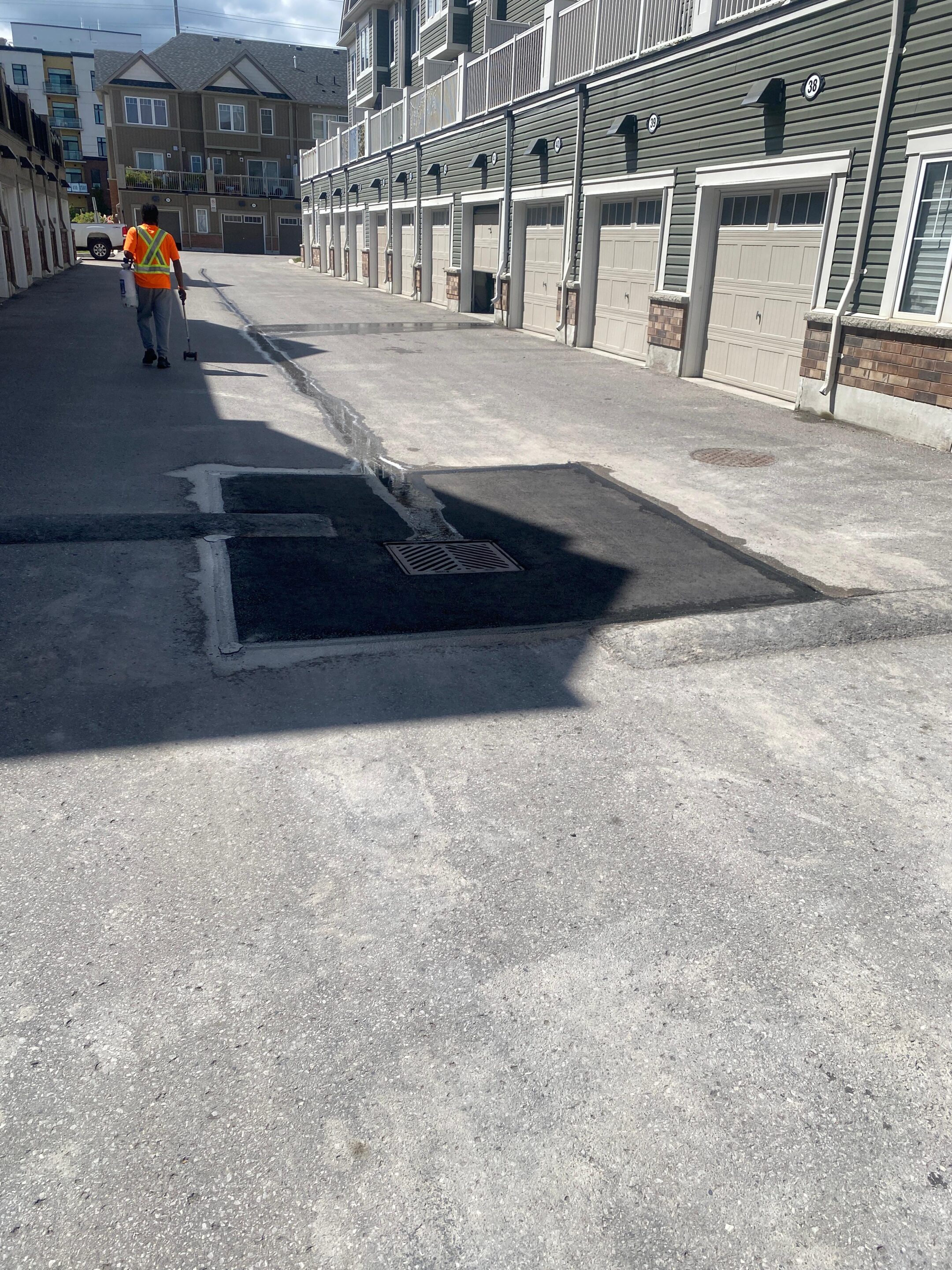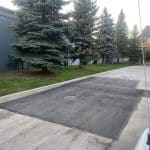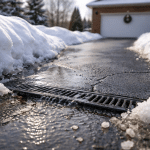When winter weather approaches, homeowners and property managers alike face a crucial question: is your asphalt ready to withstand months of freezing temperatures, snow, and ice? Without proper maintenance, asphalt surfaces can suffer significant damage that leads to costly repairs in spring. Proactive care now can prevent cracks, potholes, and structural issues later.
In this guide, we’ll cover the essential asphalt repairs to schedule before winter arrives—including asphalt crack sealing, driveway pothole repair, and overall winter asphalt preparation—with insights from experienced asphalt contractors.
Why Asphalt Maintenance Before Winter Matters
Asphalt is durable, but it’s not invincible. When temperatures drop below freezing, water seeps into cracks and expands, widening gaps and weakening the surface. Over time, this cycle—known as freeze-thaw damage—creates potholes, crumbling edges, and uneven surfaces.
If left untreated, small cracks in the fall can become major safety hazards by spring. That’s why timely asphalt maintenance isn’t just cosmetic—it’s an investment in the longevity and safety of your property.
1. Asphalt Crack Sealing: Your First Line of Defense
Asphalt crack sealing is one of the most important preventative measures you can take before winter. Cracks allow moisture to penetrate the pavement base, where freezing and thawing can cause rapid deterioration.
Professional crack sealing involves filling cracks with a flexible sealant designed to expand and contract with temperature changes. This keeps water out, reduces long-term damage, and ensures the surface remains stable through the cold months.
Benefits of asphalt crack sealing include:
- Preventing freeze-thaw damage
- Reducing future repair costs
- Extending pavement lifespan
- Improving safety for vehicles and pedestrians
If your driveway or parking lot has visible cracks, don’t wait until spring. Sealing now can save you thousands of dollars in future repairs.
2. Driveway Pothole Repair: Stop Damage in Its Tracks
Potholes are more than just a nuisance—they’re a liability. Left unchecked, potholes worsen quickly during winter. Water enters the hole, freezes, and forces the surrounding asphalt apart, creating a larger cavity.
Driveway pothole repair before winter is essential for both residential and commercial properties. Asphalt contractors can patch potholes using hot or cold asphalt mixes depending on the weather, restoring both safety and curb appeal.
Why pothole repair is critical before winter:
- Prevents vehicle damage and trip hazards
- Stops further expansion of potholes
- Protects the asphalt base from erosion
- Saves money by addressing issues early
Even small potholes should not be ignored—they only grow larger once freezing weather sets in.
3. Sealcoating for Winter Asphalt Preparation
Sealcoating provides a protective layer that shields asphalt from moisture, salt, UV rays, and chemical spills. While not always necessary every year, sealcoating before winter creates a barrier against harsh weather and extends the lifespan of your driveway or parking lot.
Winter asphalt preparation with sealcoating helps:
- Repel water and ice
- Protect against de-icing chemicals
- Enhance surface appearance
- Reduce future maintenance needs
Think of sealcoating as a shield for your investment, keeping your pavement safe through months of tough conditions.
4. Drainage and Grading Adjustments
One of the most overlooked aspects of winter asphalt preparation is drainage. Poor drainage allows water to pool on the surface, which accelerates freeze-thaw damage. Before winter, asphalt contractors can evaluate the grading of your pavement and recommend adjustments if needed.
Solutions include:
- Correcting low spots where water collects
- Installing proper drainage channels
- Ensuring slopes move water away from the pavement
Good drainage means less standing water, fewer cracks, and longer-lasting asphalt.
5. Edge Repairs and Reinforcement
The edges of driveways and parking lots are especially vulnerable to winter damage. Plowing, shoveling, and water runoff all contribute to crumbling edges. If you notice deterioration along the perimeter of your pavement, it’s wise to schedule edge reinforcement or patching before freezing weather sets in.
Reinforcing edges protects the structural integrity of your asphalt and prevents small problems from turning into major reconstruction projects.
6. Professional Inspection from Asphalt Contractors
Sometimes, damage isn’t visible to the untrained eye. That’s why a professional inspection from asphalt contractors is one of the best steps you can take for winter asphalt preparation.
Experienced contractors can:
- Identify hidden cracks and weak spots
- Recommend cost-effective solutions
- Prioritize repairs based on urgency
- Provide a long-term maintenance plan
By partnering with trusted contractors, you’ll ensure your driveway or parking lot is ready for harsh winter conditions.
The Risks of Skipping Winter Asphalt Preparation
Choosing to delay maintenance until spring may seem tempting, but the risks are significant:
- Wider cracks caused by freeze-thaw cycles
- Larger potholes that require expensive full-depth repair
- Safety hazards for vehicles and pedestrians
- Accelerated deterioration, reducing pavement lifespan
What might cost a few hundred dollars to fix in fall can escalate to thousands of dollars in major reconstruction by spring.
FAQs About Asphalt Repairs Before Winter
- When is the best time to schedule asphalt crack sealing?
The ideal time is during fall, before consistent freezing temperatures arrive. This ensures the sealant adheres properly and provides maximum protection through winter. - Can driveway pothole repair be done in cold weather?
Yes, but hot mix asphalt is preferred when temperatures allow. Cold patch is a temporary solution that can carry you through winter until permanent repairs are possible in spring. - How often should I sealcoat my driveway or parking lot?
Sealcoating is typically recommended every 2–3 years, depending on traffic and weather conditions. Your asphalt contractor can provide guidance specific to your surface. - What are the signs my asphalt needs repair before winter?
Look for visible cracks, potholes, pooling water, or crumbling edges. Any of these are signs that action should be taken quickly. - Why hire professional asphalt contractors instead of DIY?
Professionals have the right equipment, materials, and expertise to ensure repairs are durable and effective, saving you money in the long run.
Protect Your Investment This Winter
Winter can be brutal on asphalt, but you don’t have to wait for the damage to pile up. By scheduling essential repairs like asphalt crack sealing, driveway pothole repair, and sealcoating, you’ll be taking proactive steps toward long-lasting pavement.
Work with experienced asphalt contractors who understand the unique challenges of winter asphalt preparation. Investing in preventative maintenance now means peace of mind through the colder months and fewer headaches come spring.
Protect your asphalt surface
If you’re ready to protect your asphalt surface before winter arrives, contact Empire Paving today. Our team specializes in asphalt crack sealing, driveway pothole repair, and winter asphalt preparation for residential, commercial, and municipal clients across the GTA.
📍 Visit us at: 50 High Meadow Pl, North York, ON M9L 2Z5, Canada
📞 Call us today: +1 416-644-1444






